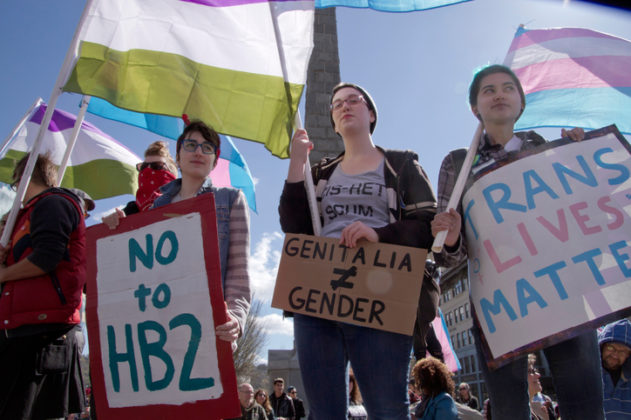In my moment of liberation and celebration as a white cis woman, I didn’t think for a moment there was a single woman there feeling shame or hurt.
“Close your legs. That’s not very ladylike!” I had never heard my grandfather say such a thing before and, at 12 years old, I was mortified.
My skinny boyish frame lay sprawled comfortably on the carpet where my brother and I were watching M.A.S.H. Oblivious to any sense of propriety or modesty, I was suddenly painfully aware of the void between my thighs. I quickly squooshed my legs together, pretending nothing had happened.
But it felt like there was a giant neon sign pointing straight at my…you know.
My grandfather’s admonishment became the first of many directed at my anatomy. From male coworkers’ jokes about ‘letting the flies out’ to bar patrons grabbing my genitals, I quickly learned that what existed between my legs was something to be laughed at and ashamed of.
So when I marched with almost 200,000 other women in Seattle last week, it felt odd yelling “pussy grabs back” at the top of my lungs in front of complete strangers.
I’ll admit, I giggled. I was embarrassed. Mind you, I’m no prude and my mother can attest to my unfortunate sailor’s mouth. But standing there, surrounded by a sea of pink knitted pussy hats and signs with fierce looking kitties and uteruses on them – I felt incredibly silly and empowered at the same time.
We were all laughing, smiling, and collectively telling the President of the United States to F-off. We were telling him — and all men like him — that our bodies belong to us. That if he or any man dares to grope or otherwise sexually assault us he would meet with the full, pent-up rage of suppressed womanhood.
It felt incredible. I was thinking of all the men in my life who had called other men “little bitches” and “pussies”. The boyfriends who were either too ashamed to go down on me or too obsessed with ‘gettin’ pussy.’ I thought about the women who flocked to the nearest labiaplastitician to get porn-approved genitals and the girls who had theirs cut and sewn to seal their shame.
Shame; the most toxic, destructive emotion, was nowhere to be seem — or so I thought. In my moment of liberation and celebration as a white cis woman, I didn’t think for a moment that there was a single woman there who was feeling shame or hurt.
The next day on social media I saw a tweet by a woman bemoaning the exclusive nature of the Women’s March: “To all the trans women out marching amidst signs that center feminism around having a vagina, I see you, you matter, thank you.”
And it felt like someone punched me in the gut.
How dare anyone tell me that I can’t celebrate what I’ve been taught to be ashamed of my whole life?! How dare transgender women tell me that I can’t talk about my own body just because I’m cis! Don’t they understand that this represents so much more than just bits and pieces?
The problem was that I didn’t understand.
I couldn’t stop thinking about the argument: Could feminism centered around uteruses and vaginas be inherently exclusionary and transphobic? If so, how were we supposed to fight for reproductive rights? How were we supposed to take back the power from men who employed our parts to shame and control us?
I stayed up late that night thinking about this seeming tension and woke the next morning stressed. And then I read an article by Katelyn Burns at The Establishment: “How ‘Pussy Hats’ Made Me Feel Excluded — And Then Welcomed — At The Women’s March.”
“It’s not my place to invalidate anyone’s language, but I am constantly aware of my own incomplete womanhood between my legs,” she wrote. “I try to pretend that it doesn’t make me different from the other women around me, but at the end of the day, I know I’m not like the rest. I see it when men reject my transness, I see it when I can’t quite always smooth the front of my pencil skirt, and I see it every time I pull on a pair of panties.”
It was thoughtful, personal, and in many ways relatable. More than anything, I was surprised by my own thoughtlessness and oblivion. I realized I was busy trying to convince myself that I was woke and, as privilege does, that my issues were paramount.
In reality, transgender women face much greater violence, and marginalization because of who they are. That’s something I (and the billions of cis women around the world) will never understand.
No one is saying that we can’t talk about our uteruses or be proud of our pussies. But feminism is only feminism when it fights for all women. When it combats all forms of sexism and misogyny—and lifts up those who are most oppressed.
There is strength, not weakness, in inclusion and intersectionality.
Jessica Schreindl is a campaign director and freelance writer in Seattle, Washington. She is a contributing writer for Mic.com and has been published on Feministing.com. She graduated with her M.A. from Syracuse University where she studied film history and documentary filmmaking.
Other Links:

